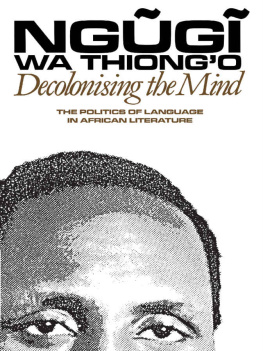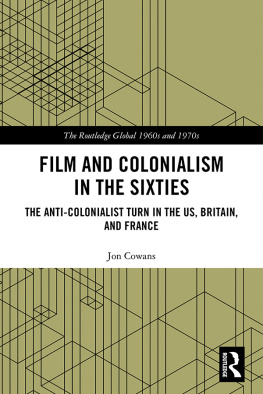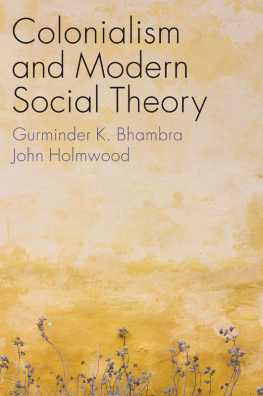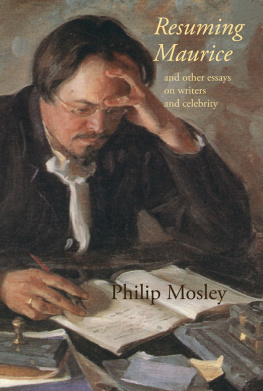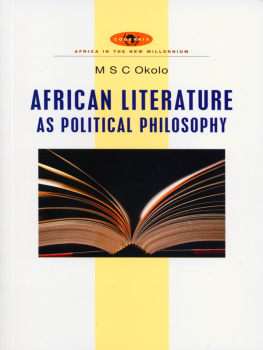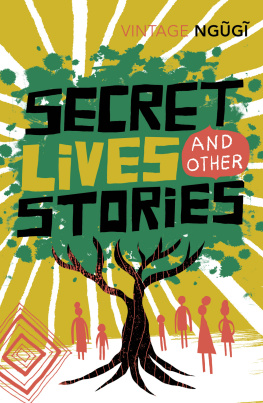This is vintage Ngugi, plain-spoken, intensely committed, and passionate about the values of freedom and struggle in which he still profoundly believes.
Elleke Boehmer, Professor of World Literature in English, University of Oxford.
Renowned worldwide, as novelist and dramatist, Ngugi wa Thiongos contributions to the body of critical writing on African literature, politics and society have been highly significant. His best known critical work is Decolonising the Mind, which since publication in 1986 has profoundly influenced other writers, critics, scholars and students.
These latest essays reflect Ngugis continuing interests and enthusiasms. His choice of writers is original. He makes us look again at their novels to address his lifelong concerns with the ways to independence, the meanings of colonialism and the takeover by neo-colonialism, and the functions of literature in political as well as literary terms. They will appeal not only to his international band of supporters. They will also introduce his views to young people discovering African and Caribbean literature.
Ngugi wa Thiongo is Distinguished Professor of English and Comparative Literature at the University of California, Irvine. Ngugi is renowned for his essays, including the seminal Decolonising the Mind (James Currey 1986); his plays, which led to his detention in Kenya; his novels - the most recent being The Wizard of the Crow (2007, translated into English from Gikuyu) and his memoirs Dreams in a Time of War and In the House of the Interpreter.
East Africa [Kenya, Tanzania, Uganda and Rwanda]: EAEP

Contents
Acknowledgement
I would like to thank Keith Sambrook who helped put this book together and Barbara Caldwell for her editorial input including making the index
Preface
These essays have roots in my personal history. On 12 December 1978 the Moi Dictatorship, in response to internal and international pressure, released me from a one-year imprisonment at Kamiti Maximum Security. But the regime ensured that I would not resume my job as Professor of Literature at the University of Nairobi. The imprisonment, without trial, had been a punitive act because of my novel, Petals of Blood, but more immediately my community based theatre work that produced Ngaahika Ndeenda (trs I Will Marry When I Want). The denial of a job was driven by the same motives: to keep me away from contact with students and regular working people.
Over the years, I had accumulated copious notes for the courses that I had given at the University of Nairobi on the European novel, and on African and Caribbean literature. I toyed with the idea of writing them as lectures, and distribute them freely, and thus defy and thwart the states intent. This would not have earned me a coin but it would have been my way of fighting back, the way I had done in prison by writing Caitaani Mtharabain/Devil on the Cross on toilet paper. In the end I did not carry it out, less because the unsolicited lectures might have been interpreted as constituting subversive literature, anything in Kenya of the Moi days could have been so interpreted, but more because the struggle for daily survival as a lumpen-intellectual was hard enough. By 1982, I found myself an exile in Britain and later in the USA.
The idea of writing on individual authors and texts migrated with me and in between my work at Yale and New York University, and without my copious notes, which were still in Kenya, I started putting down my thoughts. By 1999 I had compiled some essays, sent them to James Currey, but with the hope that I would add more to the collection. Engagement in other scholarly and creative schemes took my attention away from the project. So, although I have included more recent essays, the majority of the essays in this collection are part of that unfinished project. Some of the essays are a continuation of my conversation with the work of George Lamming, Alex la Guma and Sembene Ousmane, but, unfortunately, the last two have passed on.
The collection is not as comprehensive as originally envisaged; still, it contains some of my thinking on the individual texts and themes. They are written in the spirit that counters the tendency to use texts as touchstones for general theory; the individuality of such texts and authors homogenised into evidence and proof of theory. But each text by a writer constitutes a world whose contours are worth exploring, its sites and sights worth savouring. Literary and critical theory would gain by being anchored in texts and close reading.
The literary texts that constitute modern African and Caribbean literature were written within or under the shadow of the empire. The languages used are those of the empire; the aesthetic of resistance emerges out of the general resistance to the empire and its consequences. Much of what goes under the term post-colonial literature remains bound to the empire by the language of use. Thus although there is no extended chapter on the concept and practice of the empire, the world of these essays and the texts on which they are based have been shaped by the practice of empire and that of resistance to it. For even when the physical empire has been forced to recede in the background, the metaphysical empire remains: colonial and postcolonial literature is in continuous struggle against the psychic pull of the metaphysical empire.
These essays contain the germ of the globalectical approach that I have recently theorized in my book: Globalectics: Theory of the Politics of Knowing. They are not definitive; they are one persons view of the texts and authors. But I hope they contribute to the continuing discussions about the authors and texts and the aesthetic of resistance.
Ngg wa Thiongo, Globalectics: Theory of the Politics of Knowing (Columbia University Press, New York, 2012)
Birth of a Literature
Heinemann, African Writers Series & I
Weep Not, Child (1964)
The River Between (1965)
A Grain of Wheat (1967)
The Black Hermit (1968) play
Secret Lives, and Other Stories (1975)
Petals of Blood (1977)
The Trial of Dedan Kimathi (1977) play
Detained: A Writers Prison Diary (1981)
I Will Marry When I Want (1982) play
Devil on the Cross (1982)
Matagari (1987)
I have sometimes been accused of being a living contradiction for publishing with Heinemann in the African Writers Series. How can you, while denouncing imperialism, make a deal with a London-based publishing house that manufactures words harvested from Africa and African hands and then sells the finished product, the book, back to Africa at a profit? In what ways is this different from the similar process of gold, diamonds, copper, coffee, tea, all mined or grown in Africa, processed in the West and sold back to Africa, the price of both the raw material and the finished product determined by the West? I am of course talking about the entire intellectual production, distribution and consumption of books, as mirroring that of the economic and political relationship of Africa to the West in general.
Heinemann Educational Books (HEB) and their unique product, the African Writers Series, have been part of my literary life and tonight I want to share with you aspects of the complex feelings evoked in me by the memory of the years of that relationship, 1962 to 2002. The fact is those years have seen some of the most joyful and painful moments in my life. Let me isolate two such moments which may also shed some light on the questions asked not only about my own relationship to the Series but the Series own to relationship to events in postcolonial Africa.
Next page

